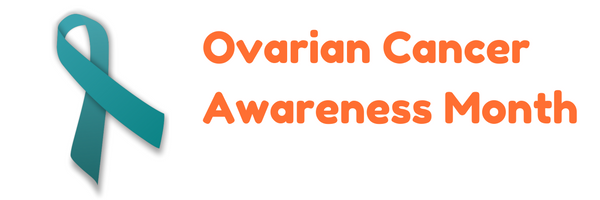Written by: Cheri Knecht
Ovarian Cancer Awareness Month – September
When ovarian cancer is found early at a localized stage, about 94% of patients live longer than 5 years after diagnosis. About 20% of ovarian cancers are found at an early stage.
Symptoms:
- Abdominal or pelvic pain

- Increased abdominal size or persistent bloating
- Increased need to urinate or urgency
- Feeling full after eating small amount
If these symptoms are uncommon for you and continue for more than a couple of weeks see your gynecologist.
General risk information:
- Two-thirds of women diagnosed with ovarian cancer are age 55 or older.
- Women who have delivered at least one child, especially before age 30, are at a lower risk for developing the disease. The more children a woman has, the more her ovarian cancer risk declines. Women who breastfeed further reduce their risk.
- Women with a body mass index (BMI) of 30 or greater may have a higher risk of developing ovarian cancer.
- Women with a mother, sister, grandmother or aunt who has had ovarian cancer have a higher risk of developing it.
- Some women who develop ovarian cancer have an inherited mutation on one of two genes called breast cancer gene 1 (BRCA1) and breast cancer gene 2 (BRCA2). Women with the BRCA1 mutation, have a 35 to 70 percent higher risk of ovarian cancer. Women with the BRCA2 mutation have a 10 to 30 percent higher risk.
For more information about Hereditary Genetic Testing available at UF go to: https://ufhealth.org/genetic-counseling-0
Several studies are in progress at UF to learn better ways to treat ovarian cancer. Contact
Cheri Knecht at 352-294-4882 about studies or other resources available.


